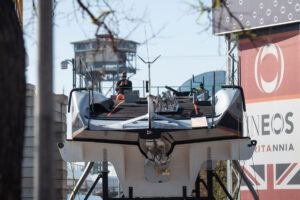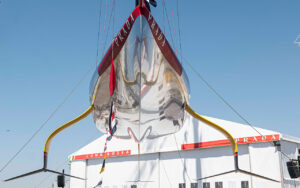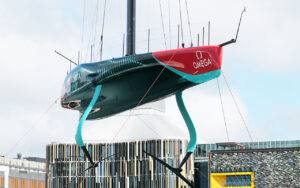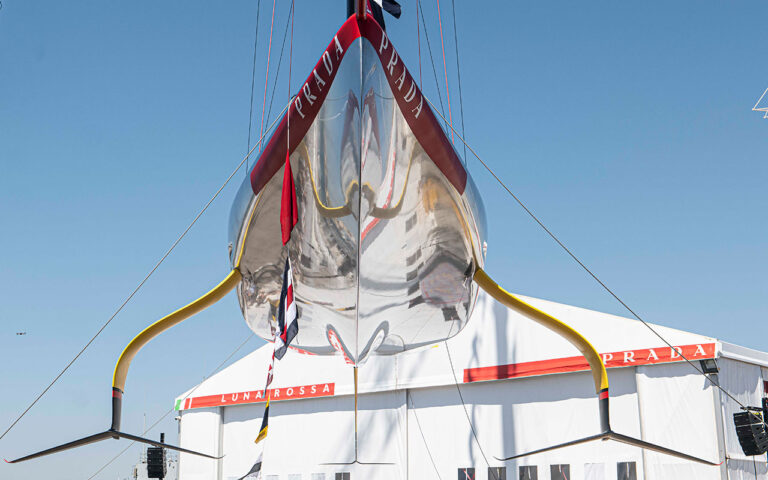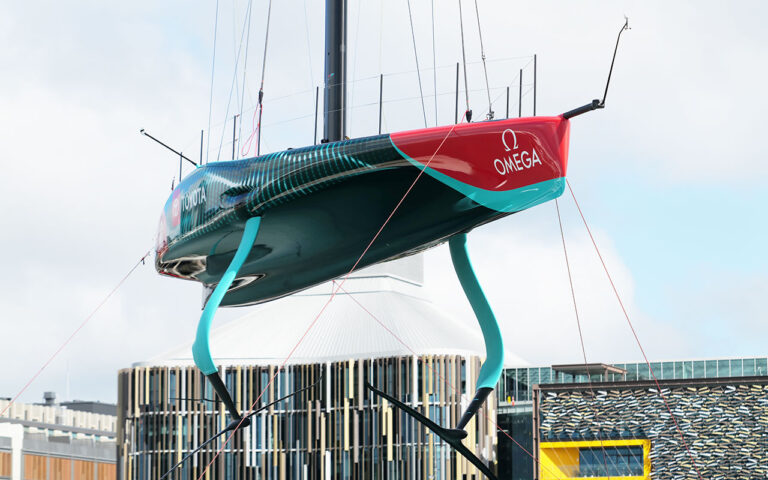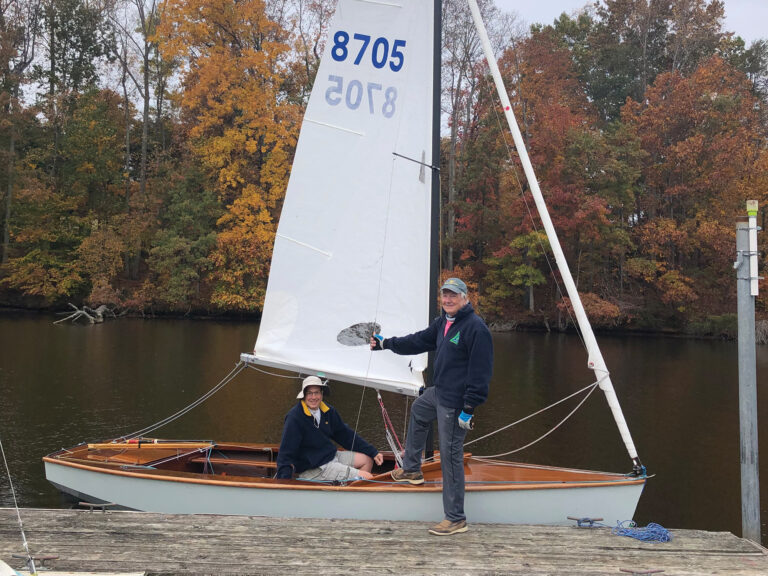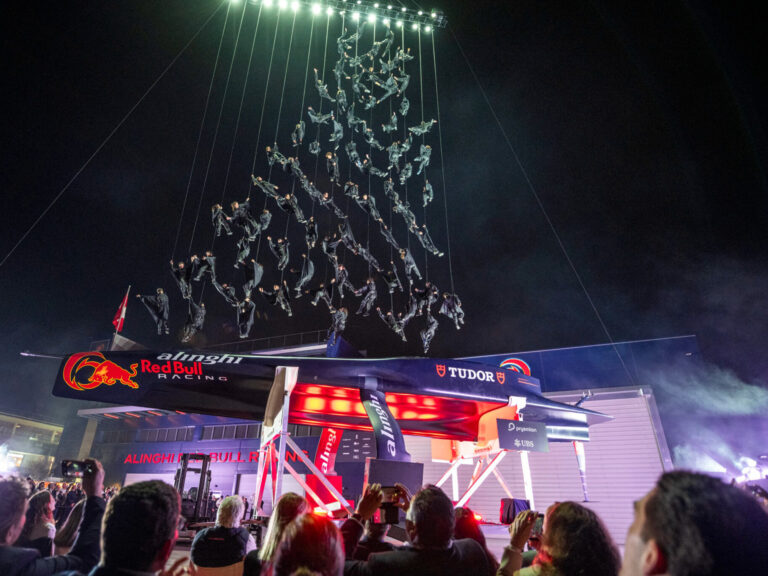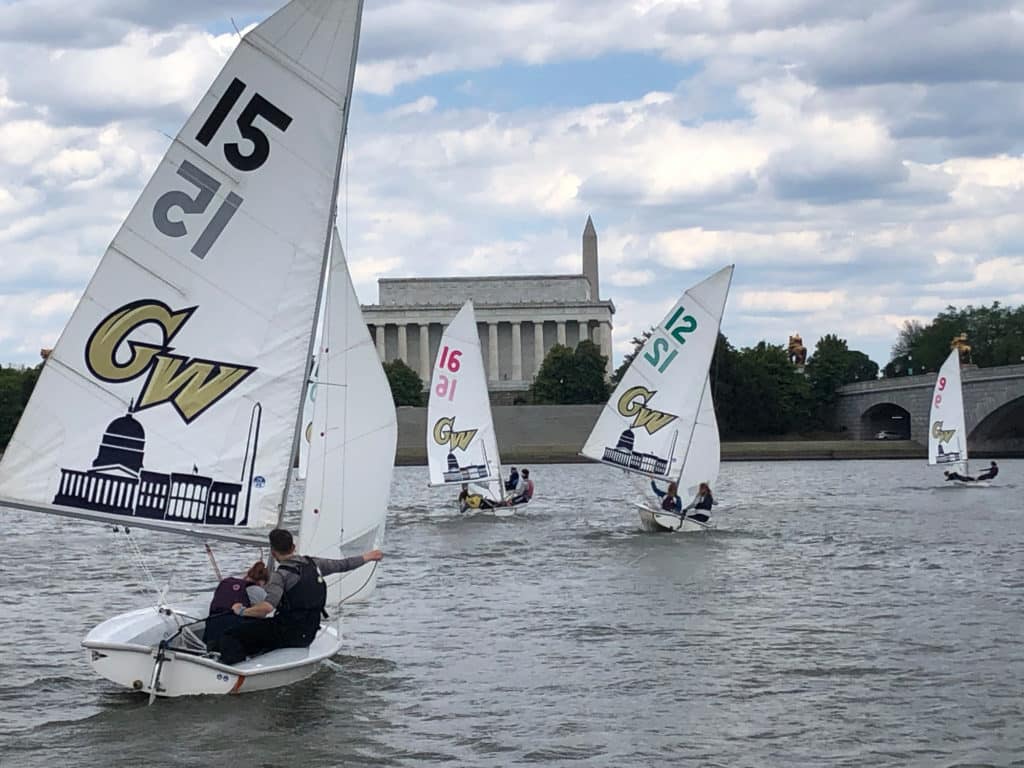
Soenke Jordan read the notice and had a bad feeling. “Group Webex, 30 minutes.” The co-captain of the sailing team at George Washington University saw a pandemic deepening and belts tightening all around him.
“As a sport that produces no revenue, sailing was a bottom priority,” Jordan says. “On the other hand, we were performing better in sailing than Colonial basketball performs in their game.”
Any supporter of college sailing might say, “Effin’ A.” But the call announced the axing of GW sailing’s varsity status at the end of spring semester, 2021. You could hear responses like “devastated” and “invalidates our achievements.”
New questions loomed large. Could a nonvarsity Colonials team match the performance of GW’s last varsity squad? That would mean qualifying for Nationals 2022 and repeating varsity’s swan-song top 10 finish. Around qualifying itself, there was a lot of confidence, and that was fully justified. The Colonials will be sailing Nationals this month in New Orleans. The rest is a drama that will have to play out on the racecourse.
Having friends at and around GW, and having developed a sudden curiosity about the state of play for nonvarsity (club) teams, I started looking around. By the time I circled back to GW, I discovered that a new spirit had taken hold there. Whether or not it has long legs, only time will tell. Meanwhile, I didn’t have to look far to find club teams contentedly sailing without varsity-level pressures to excel, or other teams exerting great effort, by choice, to match the varsity squads and doing rather well at it. Against that spectrum, it’s worth asking: Is there value a club sport might offer that varsity does not?
I’m confident the sailing Colonials weren’t asking that question as the ax came down. Without varsity-level support—for coaching, mostly—challenges mount for athletes committed to high-level competition. That’s true even though varsity status probably doesn’t mean full funding for a sailing team. It will, however, mean more funding than club sports count on, as well as advanced coaching, probably a van or two for traveling to and from practice, and the expectation that travel will be subsidized—also that travel time will be devoted to study because the demands on a student athlete are high. We’re talking college life regulated by training and competition. In eight years as a varsity team, the Colonials had developed into a force to be reckoned with, but that did not count with the bean counters.
Jordan, now a graduate, observes: “Losing varsity fell on the younger people who were recruited. They had expectations.” What cannot be measured is the sting to pride, but let’s be clear that recruiting a sailor is mostly a matter of declaring, “We want you.” There are no scholarships. Varsity teams and club teams compete together. Add scholarship money, and the imbalance would skew the game beyond bounds, but there is no threat of that.
Funding aside, the striking difference between varsity and club sports is the load of responsibility that lands on student leaders. Varsity coaches negotiate budgets. They purchase and manage boats, set practice schedules, and make the arrangements for a travel regatta, from picking the travel team and its pairings to transportation, lodging, meals, and perhaps a medical protocol. On a club team, all of that falls to students.
Out of my sampling of club teams: Maggie Swasey arrived at Miami University in Oxford, Ohio, with no intention of joining the sailing team. She knew too much. Swasey says: “In high school, I traveled every weekend—to California, Texas, Florida—and I missed a lot at home. In college, I just wanted to experience student life.”
Her freshman determination was not so fierce, however, as to keep her from attending just one little campus meeting of MU’s sailing club. And quicker than you can say “gotcha,” she was coaching, coming off a 2018 season in which Cleveland’s Rocky River High had been the first Ohio school ever to qualify for High School Nationals. Now she’s in her second year as team captain, and she can tell you all about managing a club team, negotiating budgets, and getting maybe 50 percent of the ask. Her upbeat take: “We’re one of the better-funded clubs here, along with water skiing.”
When MU runs regattas on nearby Acton Lake, she says: “I’m the regatta chair. My job is to organize the event, work with the teams, find housing, whatever is needed, then manage rotations during the regatta.”
So, we see that leadership in a club sport means you can major in whatever you want, but you will graduate with a minor in logistics.
“The goal of the Midwest Collegiate Sailing Association,” Swasey says, “is to teach sailing and encourage sailing. That’s our biggest difference from more competition-focused divisions.” MU can stand tall on regatta results, but it doesn’t expect to blow off Michigan or Wisconsin, much less go against the coastal powerhouses. Instead, teammate Jacob Maher says: “You get back what you put in. Some people just want to sail occasionally and socialize.”
The upside, as Maher tells it: “I see our people all over campus. When you’re varsity, you’re with the team much of the time. That’s fine, but we’re a different kind of community.”
What comes through is that these two are satisfied with their choices and feeling good as leaders without trying to be world beaters.
But this is a tale of two Miamis.
At the University of Miami in Fort Lauderdale, Florida, sailing is also a club sport. Even with a volunteer coach, the workload on student leadership is high, as I learned from team captain Julianna Skoglund. Then come differences. The commitment here is varsity-level. Skoglund says: “When people join, we tell them we offer four practices a week, and they’re required to make three, whatever their level. Out of our 90 members, if you’re good enough for the one-third that make up our cross-regional team, you’ll travel on weekends and go all over the US.” (This rhymes with Fordham University’s claim to be “a club sport with a varsity mindset.”)
Founded in 2004, Miami’s Sailing Canes first broke into the Sailing World top 10 coed rankings in 2011. The team practices out of the US Sailing Center, where its fleet of FJs can be supplemented with boats from other programs. Funding challenges are inevitable. With perhaps a touch of exaggeration, Skoglund mentions “one faculty member who oversees about 120 club sports. The administration is supportive, but this year we had to convince them that, on their proposed schedule of replacing halyards every five years, we had no future.”
In time, circling back to George Washington University, I talked to Mikaela Smith, who chose the school for itself, with sailing as an added attraction. Now she finds herself president of a club team that still carries varsity momentum. They met their first goal, to qualify for Nationals. But can they sustain momentum, now and going forward? I promised not to jinx anybody. However, when I talked to Smith and fellow senior Cameron Feves, I found them resolutely upbeat about the pivot to club status, and I think—I hope—it goes beyond looking for a silver-plated lining. When GW won the Middle Atlantic conference championship last fall, you could see all those roll tacks in the shadow of the Lincoln Memorial paying off.
I figure they’d be overjoyed by a return to varsity, but the Colonials have raced well this spring, just as they are. Smith reflects: “We’ve always had a strong team culture. That has strengthened in the last year. For the transition, we divided the duties of a full-time coach among the members of a board: myself, our co-captains, our fleet captain, and Cameron as treasurer hold the ‘powers’ once held by a coach. As president, I’m the administrative head. I also manage the website and a lot of other details, but I expect the next president will delegate more. Our captains manage practices and regatta pairings. Absent top-down decisions from a coach, selecting regatta pairings can be political—but we’re all friends. And it’s funny how life ties things together. I’m applying to law schools. I wrote our club-sport bylaws and constitution, and those became part of my résumé.”
Feves, 2019 youth national match racing champion, sums up: “As a gut reaction to losing varsity, I was plenty upset, but what we’re forced to do now comes with opportunities and freedoms. Learning to manage those should pay off someday in the working world. We agreed among ourselves that we were strong enough to stay organized and keep going. Losing coaching weighs more negative than positive, but coaching as a student is a learning experience in itself. It’s a different practice dynamic, and in the big picture, it matters that we’re in charge. At conference champs, we sent out people who wouldn’t have had that chance on a varsity team—and we won.”
About the Inter-Collegiate Nationals 2022: Racing will be hosted on Lake Pontchartrain May 16-26 by the Tulane Green Wave. Among 36 qualifying teams, the GW Colonials advanced in both Women’s Fleet Racing and Open Fleet Racing. The University of Miami Canes were selected in Open Fleet Racing, as was Fordham—noting the nonvarsity teams mentioned in our story.
Open Team Racing May 16-18
Open Fleet Racing May 19-22
Women’s Fleet Racing May 23-26

